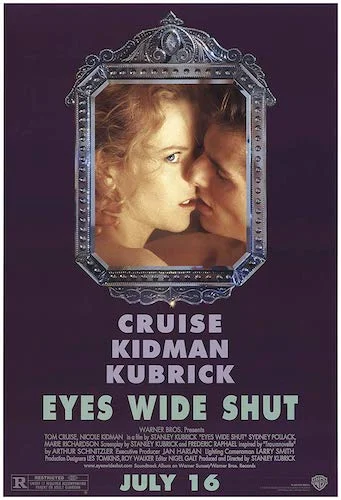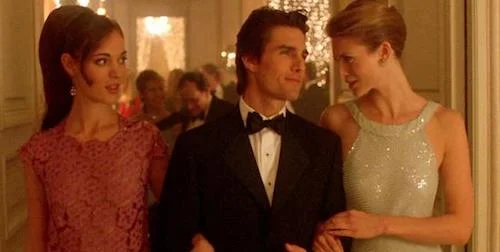Eyes Wide Shut: On-This-Day Thursday
Every Thursday, an older film released on this opening weekend years ago will be reviewed. They can be classics, or simply popular films that happened to be released to the world on the same date.
For July 16th, we are going to have a look at Eyes Wide Shut.
As nature always intended, a Stanley Kubrick film is beloved years after it confused audiences. The difference here is that there is a bit of a stronger argument as to why Eyes Wide Shut conflicted viewers when it first came out. Kubrick passed away months before this film was released. There are a number of differing reports. This film was the final cut the director intended. It was being worked on when he died. He barely touched the film, and a team did their best to follow his notes. Eyes Wide Shut is a rare enigma of its kind. We don't know the full story. Kubrick is an infamous perfectionist. Was everything in this film as intended? If so, what is each element of the film saying?
The film was shot at an exhaustingly long rate. 400 days of production. Kubrick drew all of the soul out of the usually charismatic then-power-couple Tom Cruise and Nicole Kidman. Here, they are exhumed corpses of the New York upperclass. They seem tired, but in a way that makes us tired with them. Eyes Wide Shut has been described as a dream like state many a time before. It's the kind of film that only works when it is dreary. Speed this story up, and you miss out on the haze of existentialism.
The film begs for adventure and a unique experience, and its glacial nature instills an unforgiving damnation for this request. Bill Harford feels enticed to change his life up a bit when things at home get stale and bitter. This happend around Christmas: a traditional time of giving and charity. In a broken life, tradition turns to habit, which turns to curse. A new world opens up for him, and this portal actually ends up being the most clearly rendered sequence of the entire film. No fuzzy radiance. No bleeding colours. Everything is crystal clear.
This moment is so affecting, because you survived the first act. You feel as though you are in a partial state of rest. Like any true nightmare, the mansion scenes happen when you are at your most vulnerable. Images are sharp. The music is titanic. Everything is overwhelming and you do not know where yo begin. All you know is that you should not be here. Between the reversed hymn (which now sounds demonic), and the haunting choreography, you know this is a dangerous setting that has you locked in place.
Nowadays, this part of the film and the conclusion are relatively tame. Does Bill feel bad out of guilt? Apparently, the film was meant to go one step further. This was meant to be more than just a masquaraded orgy. Once again, you get different stories depending on who you ask. Some may say this film was meant to be another Rothschild conspiracy, down to there having been human sacrifices during the mansion sequence. Others may suggest more graphic sexual content. We will never know, but we may now see Bill as having felt threatened more than just feeling guilty.
That mystery also helps the film age a bit better. The mansion itself is mysterious, and so is the actual state of the film. Much of it is a series of empty spaces having to be filled in (from an academic standpoint). You also can't play the convenience card of "this doesn't add up because it isn't a finished film", but you luckily don't have to go that far. The film as a narrative is not stuffed with plotholes. We just know how Kubrick is. Is this the exact film he would have released? Would it have been better? Could it have been worse? Like Jai Paul accepted when he finally released his leaked set of demos as the full length Bait Ones, we live in a world where this is Eyes Wide Shut (take it or leave it).
Kubrick has always been associated with conspiracies (no, he did not direct the moon landing footage). The insinuation many fans have that Kubrick may have been assassinated because of the revelations cut from Eyes Wide Shut (of a secret society hidden of the elite) will go down as one of the most shared urban legends of our time. It only adds to the unsettling nature of the film: viewers have been so shaken up, they demand to understand the film as something externally impactful. According to those that worked on the film, Kubrick died of natural causes. You can't stop the racing river of conspiracists, though.
We end the film humbled, frightened, and taken off guard by the final line (I will not spoil it for those of you that have not seen the film). The entire film and its epic scale are means of rendering you speechless, and it does an excellent job at that. You may have an idea of what you may see (it's that film about the orgy), but you truly have no concept of what you are in for. You may have your patience tested. Then you are attacked when you least expect it. You finish the remainder of the film with a flight response, ready to take off. The film gets dangerous in the real world. Nothing is safe.
Was Kubrick opening our eyes to a community we never knew existed? Was he trying to replicate how dreams and nightmares work? Did he just want to push buttons, and venture through new territories (like he always did)? Who knows. Eyes Wide Shut is the kind of film that is an experience more than a straight up story, so it means a variety of things to different people. A psychological horror. An unsolved conspiracy. A state of sleep paralysis. A commentary on greed and desire. Just another Stanley Kubrick masterpiece. Like Bill, we'll never really know what to make of it, and that kind of makes it, well, it.
Andreas Babiolakis has a Masters degree in Film and Photography Preservation and Collections management from Ryerson University, as well as a Bachelors degree in Cinema Studies from York University. His favourite times of year are the Criterion Collection flash sales and the annual Toronto International Film Festival.









